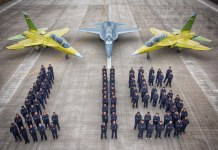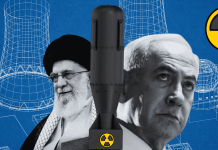China has kicked off the second edition of joint military drills with the United Arab Emirates. The drills are being conducted in China’s northwest province of Xinjiang, home to China’s detention and re-education camps for Uyghur Muslims.
China’s Defense Ministry announced that the two sides are conducting annual drills dubbed Falcon Shield-2024 in Xinjiang. The drills involving the Air Forces of the two countries reportedly kicked off in late June and are expected to continue until late July, spanning almost a month of aerial maneuvers.
The ministry stated on July 10 that the drills between the two Air Forces seek to “enhance mutual understanding and trust, deepen exchanges and cooperation, improve strategic cooperation, and achieve common goals and expectations of both sides.”
The Chinese Defense Ministry did not specify which aircraft were participating in the ongoing drills, nor did it specify the size of the respective contingents or the scope of the drills.
The Falcon Shield-2024 is the second iteration of China-UAE drills. Last year, the Falcon Shield-2023 joint training exercise was held in Xinjiang in the month of August. At the time, the drill was seen as a message to the United States as both Washington and Beijing continued to vie for influence in the Middle Eastern region, including the Gulf.
As part of a strategy to expand its footprint in the region, China has been making concerted efforts to forge closer economic and military ties with Middle Eastern countries, which have traditionally been seen as a US bastion. China’s growing arms sales to Middle Eastern states are another evidence of its outreach to the region. The UAE, for example, purchased the Chinese L-15 trainer aircraft in 2023.
The UAE also primarily uses Chinese combat drones, like the Wing Loong 1 and Wing Loong 2. Additionally, there were reports that the UAE also purchased Blue Arrow 7 anti-tank missiles from China in 2017 for use on its Wing Loong 2 fleet.
In a more intriguing case, after being refused the US’ fifth-generation fighter, the F-35 Lightning II, the UAE has reportedly been exploring the option to acquire China’s stealth fighter. While there is no official confirmation about this, analysts believe that the chances of a Chinese stealth fighter, J-20, or the under-development FC-31 acquisition could be explored.
China has made no bones about wanting to expand its presence in the region. Last month, for instance, the Chinese Defense Ministry announced that both sides – China and the UAE – had emphasized the willingness to share experiences on defense and security. The two agreed to strengthen visits, joint training, and exhibitions last month.
With this rapidly growing cooperation between the two states, it is hardly surprising that their air fleets are training together. Both China and the UAE regularly participate in military drills with other participants. China is currently also training with Laos.
However, it is the location of the air drills between China and the UAE that has grabbed eyeballs. Xinjiang, a northwestern Chinese province, is home to China’s minority Uyghur Muslims.
Significantly, Xinjiang has been chosen as the preferred site of military drills with an Islamic country (the UAE) despite accusations that it houses an array of re-education camps for the Uyghur community. Several human rights organizations have lamented that these are detention camps disguised as re-education facilities by the Chinese government.

Xinjiang: Home To Oppressed Uyghur Minority
For several years, China has been accused of persecuting its Uyghur population, based in Xinjiang, a charge it has opposed fiercely. It faced international criticism for its human rights record in Xinjiang at the United Nations Human Rights Council session in Geneva.
The United States representative on the Rights Council, Michèle Taylor, said that there is still “ongoing genocide and crimes against humanity in Xinjiang,” which is home to a large Uyghur population. She further added that China “has refused to take action amid consistent calls from the international community to respect human rights and fundamental freedoms and has rejected numerous constructive recommendations.”
Over the years, China has come under fire for its treatment and detention of Uyghurs and other Muslims. A damning UN report published by former UN rights chief Michelle Bachelet in 2022 stated that China’s treatment of Uyghurs could constitute “crimes against humanity.”
Human rights organizations have said the Chinese government has been systematically attacking Turkic Muslims and Uyghurs in Xinjiang since 2017. This includes mass arbitrary detention, torture, enforced disappearances, mass surveillance, discrimination based on culture and religion, family division, forced labor, sexual assault, and breaches of reproductive rights.
China has incarcerated roughly one million Muslims in Xinjiang in "political education" camps for offenses as minor as having a beard.
Read the report from @CSISHumanRights here: https://t.co/WfqHyedbfW pic.twitter.com/SQJTylIXzR
— CSIS (@CSIS) December 19, 2018
While China asserts that it established “re-education” camps to deradicalize the Muslims, its critics have said these were detention camps that unlawfully imprisoned the Uyghur Muslims. Since the last couple of years, China has maintained that these political re-education camps have been shut, but there is widespread evidence that suggests that the Uyghurs remain under detention, and no mass release has been observed.
Foreign governments have denounced Beijing’s Xinjiang policies, and some have imposed targeted penalties and other measures on Chinese government employees, institutions, and businesses connected to human rights abuses.
Contrary to condemning what is believed to be Chinese persecution of the Uyghurs, the UAE has publicly supported Beijing’s Xinjiang policies. In 2019, while hosting the UAE Crown Prince Mohammed bin Zayed al-Nahyan in Beijing, Chinese President Xi Jinping officially thanked the UAE for its “valuable support” of Xinjiang.
In response, the crown prince of Abu Dhabi stated that the UAE “highly appreciates China’s efforts to protect the rights and interests of ethnic minorities.”
He declared that the UAE and China would be prepared to “jointly strike against terrorist extremist forces,” which would include the East Turkestan Islamic Movement, a militant organization Beijing accuses of trying to support secession by the Uyghurs.
- Contact the author at sakshi.tiwari9555 (at) gmail.com
- Follow EurAsian Times on Google News




